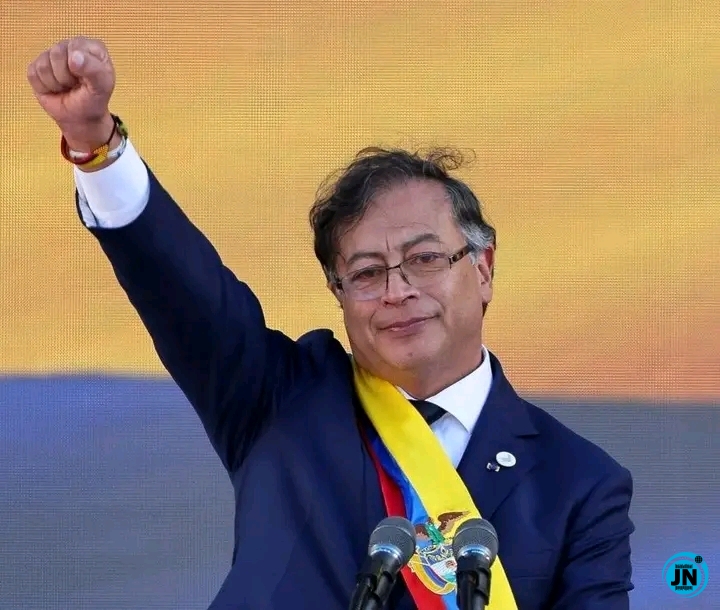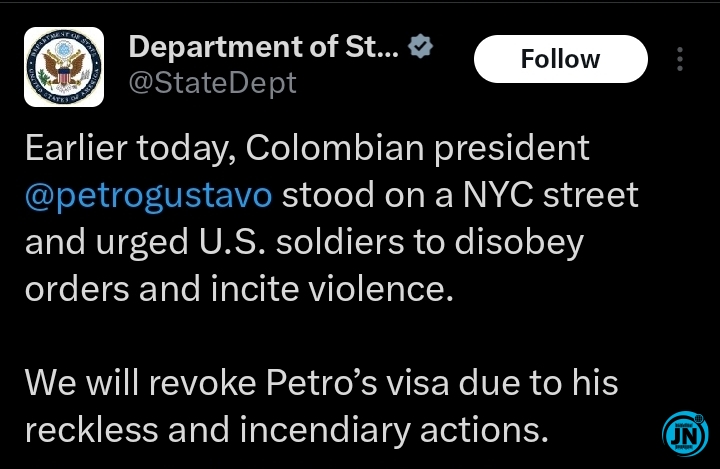The United States government has officially announced its decision to revoke the visa of Colombian President, Gustavo Petro, marking a significant diplomatic move that has garnered attention from international observers and political analysts alike.
The announcement was made via a recent post from the US Department of State on X (formerly Twitter), detailing the reasons behind the unprecedented decision and highlighting concerns over statements made by the Colombian leader during his visit to New York City.

US To Revoke Visa Of Colombian President, Gustavo Petro
According to the official tweet from the Department of State, the decision to revoke President Gustavo Petro’s visa was prompted by remarks he made urging US soldiers to disobey orders and prioritize humanity over military directives. Such comments were viewed as reckless and potentially inciting unrest, prompting swift action by the US government to restrict his travel privileges.
The tweet specifically stated, “Earlier today, Colombian president @petrogustavo stood on a NYC street and urged U.S. soldiers to disobey orders and incite violence. We will revoke Petro’s visa due to his reckless and incendiary actions.” This statement underscores the US government’s position that such rhetoric is unacceptable, particularly when it comes from the head of a foreign state visiting American soil.
It is important to note that President Gustavo Petro made these remarks during a speech at a pro-Palestinian protest outside the United Nations headquarters in New York City. During the address, Petro directly appealed to US soldiers, stating: “I ask all the soldiers of the US army not to point their guns at humanity. Disobey the orders of Trump. Obey the orders of humanity.” His words were interpreted by US authorities as a direct challenge to the chain of command and a call for civil disobedience, which ultimately influenced the decision to revoke his visa.
Historically, this is not the first instance of a Colombian president facing such a measure. Ernesto Samper, who served as President of Colombia from 1994 to 1998, had his US visa revoked in 1996 amid allegations that his presidential campaign had received funding from the Cali cartel. This context provides a precedent for how the US government handles situations involving Colombian leaders when concerns about legality or public statements arise.
Reactions Trailing Below…
The news has sparked a variety of reactions from social media users and political commentators. Babatunde Owa wrote, “In his speech while he was in USA, he appealed to US soldiers to disobey their president’s orders. He was looking for trouble.” This perspective emphasizes the perceived recklessness of Petro’s comments and their potential diplomatic consequences.
Kange Andrew added, “Donald Trump the only president who knows how to deal with leaders of the world whose motions supported terror activities.” This comment highlights the polarizing nature of international responses to Petro’s statements and the broader political discourse surrounding the US-Colombia relationship.
Nuraieyn shared, “They will lie to you about democracy and freedom of speech just to steal your lands.” This reaction underscores skepticism regarding US foreign policy and the motives behind visa revocations for foreign leaders.
Tyson offered another perspective, noting, “Soldiers by law are supposed to disobey unlawful orders anyways. The President of Columbia was simply reiterating US law to only obey lawful orders.” This comment seeks to clarify that Petro’s message may have been in line with US military principles, even if it was perceived as provocative by authorities.
See visual reactions below …

The revocation of Gustavo Petro’s visa marks a rare instance of direct diplomatic repercussions resulting from public statements made by a sitting foreign leader while in the United States. Analysts suggest that this incident could affect bilateral relations between the US and Colombia, sparking further debate over freedom of speech, diplomatic protocol, and the responsibilities of world leaders when engaging with foreign audiences.
Moving forward, it remains to be seen how Colombia’s government will respond to the US decision and whether any efforts will be made to appeal the visa revocation or mitigate the diplomatic fallout. The international community will likely be watching closely, as this development may set a precedent for how similar incidents are handled in the future, particularly regarding public statements made by foreign dignitaries on American soil.